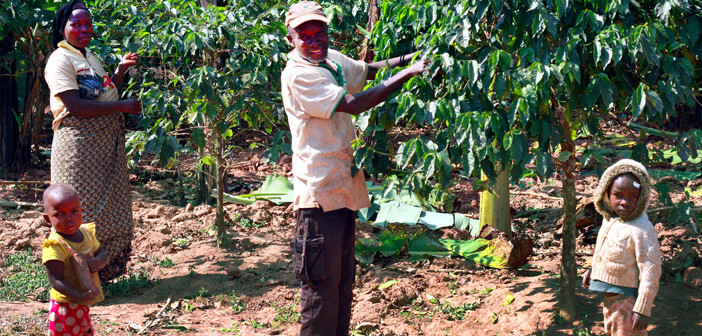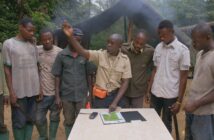The Jane Goodall Institute’s Gombe Masito-Ugalla program (GMU), paves the way for Tanzanian business owners and entrepreneurs to improve their livelihoods. The GMU program provides education on ways to improve the production process of farmers, whether they grow crops, care for livestock, embrace agroforestry or manage beehives.
One particular program which the GMU program is proud to support is the Kanyovu Coffee Cooperative Society, a consortium of 12 different coffee collectives. The Kanyovu Coffee Cooperative Society supports over 7,600 coffee farmers looking to improve their sustainable livelihoods. By supporting Kanyovu, JGI provides technical knowledge of farming skills such as farm management and postharvest processing, improving the quality and quantity of produced crops. JGI also helps train young farmers in the art of successful marketing, improving the profits of members in each of the 12 coffee collectives in Tanzania.
Sarafina, a young female coffee farmer now based in Kigoma, Tanzania, highlights the successful impact of JGI’s technical support of the coffee consortium. When Sarafina began growing coffee on her banana farm in 2002, she could hardly profit enough from her efforts to support her family’s most basic needs. Poor marketing was to blame. But since joining the Kanyovu Coffee Cooperative Society, her coffee yield and profits have steadily increased. In her first year, she Sarafina grew about 100 kg of coffee at 7,850 shillings per kg, the modern American equivalent of $3.61 for every half pound of coffee. In her first harvest, Sarafina made about $300. By her third harvest, after increasing her crop yield to 250 kg, Sarafina made over $700. This gave her the capital and confidence to buy a new plot of land in Kigoma, about 30 km from her home village.
The GMU program provides support to farmers like Sarafina at every stage of the production process. The program loans fertilizers, pesticides and other needed resources on credit once members join the Kanyovu for a fee. The Society provides washing stations and storage facilities while processing their crops. After harvest, farmers return these short-term loans to Kanyovu, and they receive access to marketing channels to promote their products as another perk of their membership. And Sarafina? She’s also a coffee laboratory technician for Kanyovu now, which means that she samples the quality of the consortium’s different coffee beans before they reach the market. It’s the success of farmers like Sarafina that make JGI’s investments in sustainable livelihoods worthwhile.





